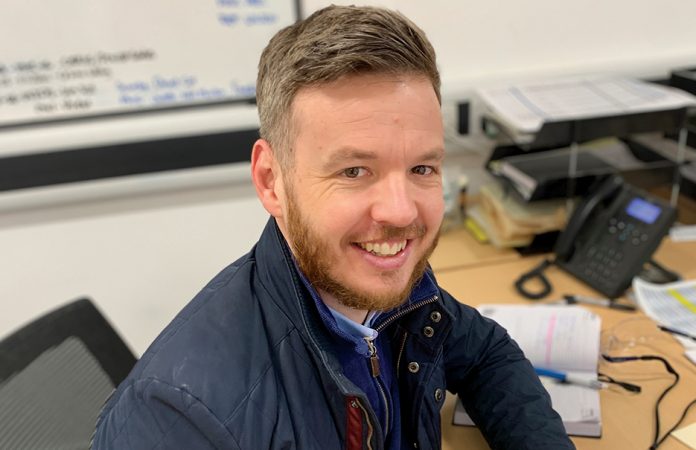In today’s high-tech work environments, ensuring the next generation is equipped to step up to the plate is crucial. Here, an engineering company tells East Anglia in Business about its approach to training and development
The energy industry is a constantly evolving sector characterised by innovation and the development of new technology.
So the need to continually refresh and renew the workforce is critical to future-proofing, ensuring there isn’t a shortage of skills when expert personnel move on or retire.
Controls technology company Proserv, for one, is doing its utmost to maintain a fresh blood supply, not least at its centre in Great Yarmouth. At Artemis House, staff play a major role in delivering its cutting-edge subsea controls technology.
Manufacturing manager Lee McLean says tapping into the supply of young talent in East Anglia efficiently is key to the firm’s future.
“Most of our apprentices come through our close relationship with East Coast College,” he said. “Early in the year, we put out advertisements and interest levels are invariably strong.
“The recruitment process is time-consuming and intensive, as last year we had 60-70 applicants competing for two apprenticeships.”
Company and college then work together to tailor an engineering course that suits both the requirements of the students selected and the firm. This year, apprentices will divide their week into two days of study and three in the workshop at Artemis House.
The industry went through several years of downturn from 2014 after the oil price slumped, but despite the challenges, the firm’s strategy around apprenticeships remained resilient.
Lee said: “Regardless of market conditions, we have always brought in at least two a year, as we have a commitment to developing our youngsters and we have stuck firmly to that.”
For aspiring engineering apprentices, McLean reveals the firm tends to look for a particularly strong drive in candidates, such as an enthusiasm for maintaining vehicles or undertaking a Duke of Edinburgh’s Award, because “every applicant will say he or she is a team player, so we look for something that sets someone apart.”
It was a long-standing interest in engineering itself that encouraged second year apprentice Yasmin Madden down this particular training route.
“I chose to undertake an apprenticeship after leaving school,” she said, “because I thought going straight from school to this industry gives me the best opportunity to learn and achieve what I want to.
“I also feel coming straight into an apprenticeship gave me more of an insight into a working environment and more of an appreciation of it.”
First year mechanical apprentice Toby Bass opted for an apprenticeship rather than university as it offered him a practical understanding of “how and why things are built like they are.”
Although Toby had studied an A-level course in engineering, initially the adjustment to in-job learning on an apprenticeship was difficult.
“At first, I felt a bit out of my depth,” he said, “as previously I had no real experience of working with tools. However, I quickly picked up some of the basic skills and understanding and began to enjoy what I was learning.”
Like Toby, Ewan Holland is a first year mechanical apprentice and he too was attracted by the practical elements of what an apprenticeship offers, always enjoying “hands-on tasks”.
Ewan has thrived in his new role. “I am learning new things every day, while having the opportunity to be in and about big projects,” he said. “This has helped me gain an understanding of how the business operates and also has allowed me to pick up key skills from the technicians around me.”
Yasmin, Toby and Ewan all have one eye to the future too – HNC or HND courses are possibilities further down the line.
Proserv makes a point of engaging with local training events, such as the annual Skills for Energy show run by the East of England Energy Group. Apprentices regularly represent the firm and talk to students about their plans and aspirations.
Lee McLean explains why. “There is nothing better than a wannabe apprentice talking face-to-face with someone who is actually going through what they want to do in a couple of years’ time. They get first-hand knowledge of what the role entails.”
Meanwhile Proserv is also pursuing a yearly internship programme and has a growing connection with the University of East Anglia.
Senior engineer John Spatchett has represented the company at several of the university’s careers fairs and recently participated in a SELECT event, during which undergraduates took part in 12 minute ‘speed’ interviews to secure work placements or future sponsorship.
The event was part of a tie-up between UEA and local and national engineering firms. John said: “After the SELECT interviews, we draw up a shortlist of candidates to come in for an in-depth chat and from there we approach one or two, who are offered a 12-week summer internship.
“If an intern then makes a positive impression, we would strongly consider approaching him or her about a full time opportunity after they finish their studies.”
He points to the impact, ideas and skillsets young graduates can bring to a team. “Graduate engineers can offer a fresh pair of eyes, questioning why things are done in a certain way, which might then greatly improve efficiencies, or they might have used a particular type of software at university which could be introduced.”
When a firm is looking to recruit young talent, Lee McLean believes there are certain core attributes to look out for in prospective candidates.
“You want to see passion, a personality and someone who is inquisitive,” he said. “For instance, apprentices are young people aged between 16-18, so their CVs are understandably still taking shape.
“You are investing in that person for the future, because their skills will come over time, so at this stage you want to see potential.”





